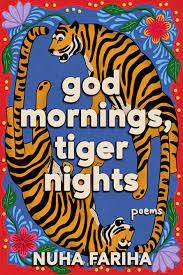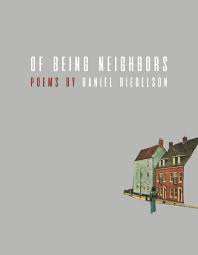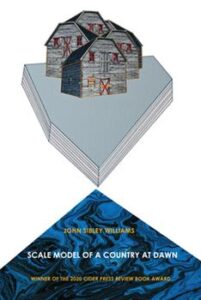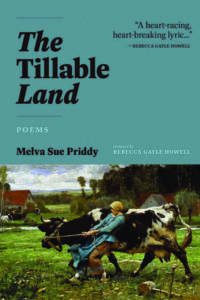Reviewed by Michael Sutherlin | April 22, 2021
Dos Madres Press, 2020
Paperback, 196 pages, $20.00
If you are looking for a cerebral investigation into the nature of language, Daniel Gabriel’s Hamlet Figura is for you. It is a single work divided into a series of 175 individual poems, each written in free verse and organized into two stanzas with five lines each. Despite the simple structure and prosaic language, this is not a collection that comports itself to skimming or exclusionary reading. As Gabriel states in his preface, the poem interprets Hamlet from the basis of two major premises: “that Hamlet is caught up with language as such, and that language in general creates world and is redemptive, whether or not the play represents this point of view.” The collection thus requires that readers have prior knowledge of Hamlet and at least a rudimentary (preferably greater) knowledge of linguistic theory. As someone who enjoys both, I can tell you that Gabriel challenges his readers to read and re-read the collection, the play, and the assortment of linguistic theories referenced throughout.
One of the most fascinating aspects of Hamlet Figura is the overarching use of the term “figura.” The term denotes a person or deed that is symbolic of some fact or ideal. In one respect, “Hamlet figura” can mean that the character, Hamlet, is symbolic of the way in which language works in society. The poem easily lends itself to this reading because each character represents a different relationship with language. For instance, the ghost king represents “the language of the dead” (1), which is a commentary on how past meaning and value systems (political systems, hierarchies, patriarchal systems, language systems, etc.) still haunt and influence the next generation. Hamlet, as representative of this next generation, must decide whether to accept the old systems as truth or consider them insane ramblings that have no bearing on the present. Take for instance Hamlet’s interaction with the ghost of his father/king:
[Hamlet] must be able to read his father’s lips
In their fiery and splenetic gravity.
He must try to read an antithetical language in this storm. (8)
This poem, and others in the collection, captures the way societies inherit the language and values of their predecessors. On the one hand, we cannot completely understand the old language because we did not grow up in that era. On the other hand, like the image of Hamlet’s father, the old meaning systems are still important, and we feel an obligation to honor them. Gabriel’s use of Hamlet thus cleverly functions as a figura for the way language influences the motives and actions of the current generation.
In addition to Hamlet being symbolic of language, Gabriel also treats the play, Hamlet, as a figura, which corresponds with Aristotle’s classification of a play as an act or deed. Gabriel presents the play as both an instance of old language (a classic literary work) combined with new language (modern use of linguistic theory). This mixture of old and modern creates something new that neither embraces nor fully accepts Shakespeare’s play. For instance, in contrast to the classic tragedy of Ophelia, Gabriel presents her madness as romantic, innocent, and even heroic. She desires the innocence of her youth while also rejecting the culturally accepted sanity of the current, immoral political system. She is “consciously mad” because her words “undermine the terror of the regime, / The violence of rational discourse” (66), and “Her madness can undo the official language” (70). Ophelia’s voice becomes an “existential scream” (68) that revises and rejects language. Her death is given honor and dignity that some might say is robbed of her in the play. This is particularly exciting because it reads into Hamlet a feminist philosophy of language. Ophelia represents the rejection of violent linguistic systems while Gertrude functions as a character that neither accepts the old system (Hamlet), the new system (Claudius), nor Ophelia’s insanity: “The queen walks back and forth on the battlements pondering” (86). This allegorical mode allows readers to see how these characters (and linguistic systems) silence and encourage each other. In this way, Gabriel helps readers witness the effects of language beyond abstract theories. Such a perspective is fruitful for revitalizing the classical conception of Hamlet and helping readers understand the social power of language.
Gabriel’s Hamlet Figura is clever and intriguing. In many ways, Gabriel’s work reminds me of a cross between William Blake and T. S. Eliot. Like Blake, the poems are highly imaginative and originate from an obviously thoughtful examination of the world. Additionally, like Blake, the poems are very much enmeshed with the author’s unique philosophies and idiosyncratic worldview. This unique mixture is what makes Blake enjoyable, but it can make his work challenging and esoteric. The collection mirrors Eliot’s style in Gabriel’s combination of modern philosophy with traditional literary references. Gabriel repeatedly references philosophical terms and thinkers throughout the work, but the subject of Hamlet offers Gabriel the material to cleverly explore his ideas from a contemporary point of view. Although the many references can at times feel overwhelming, readers will likely find them helpful. They allow the reader to look up the specific terms and thinkers referenced so that one can better explore Gabriel’s ideas. In this sense, Gabriel’s work is particularly useful for readers who would like an artistic exploration of their linguistic interests or a linguistic exploration of their artistic interests in Hamlet.
ABOUT THE AUTHOR
Daniel Gabriel is the author of Hart Crane and the Modernist Epic: Canon and Genre Formation in Crane, Pound, Eliot, and Williams (Palgrave Macmillan, 2007), Sacco and Vanzetti (Gull Books, 1983), and Columbus (Gnosis Press, 1993); and the editor of Richard Darabaner’s Plaint, a collection of his poems (Dos Madres Press, 2012), for which he also wrote the introduction. Sacco and Columbus are both book-length poems, or poetic works, on historical subjects. Theater productions include a stage version of Sacco and Vanzetti, and the plays The Four Seasons of Salt, Exits, Snowbound, and The Fortunate Instant, an adaptation of Edgar Allan Poe’s “The Fall of the House of Usher.” He has a Ph.D. in English from The City University of New York Graduate School, and taught for many years at Rutgers University. He lives with his wife Marlen, a writer, in Berlin, Germany.
ABOUT THE REVIEWER
Michael Sutherlin is a Ph.D student in English at the University of Tennessee Knoxville where he specializes in Modernism and Literary Theory. His current focus of study is twentieth-century didacticism and propaganda, especially in relation to religious and secular rhetoric.






